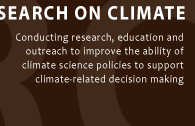

LEADERSHIP IN AGENCIES: |
|
J. Michael (Mike) Hall demonstrates how one person can encourage the production of usable science throughout an agency and a research initiative. Hall was the Director of the Climate and Global Change Program at the National Oceanic and Atmospheric Administration, a Federal agency charged with understanding changes in the environment to support decision making. In the grand scheme of things, the program’s budget was relatively small ($70M annually out of a $2B Federal investment), but the influence of the program was far-reaching because of the outlook and practices that Hall instilled in his employees. Hall himself was a systems thinker, looking at the big picture and encouraging others to do so. Many who worked for him were inspired by this larger vision, and an office atmosphere was created where civil service in the government was exciting, effective, and ground-breaking. Hall listened to everyone, and remained open and curious about new ideas his entire career, while remaining grounded in strategic thinking and a practical approach. He encouraged risk-taking, creating an environment where it was “ok to screw up,” especially if that was done in the context of stretching and attempting something new and innovative. |
 |
Hall was fond of saying “sometimes you just have to break some pottery” in order to move forward with a different direction. He assembled a team that spanned across many different disciplines, and looked specifically for people who could think broadly and who came from different backgrounds, both within government and from academia. Most importantly, Hall empowered his employees to seize opportunity, do what needed to be done to address the important goals, and not shy away from larger challenges. For Hall, the bigger the challenge the better, and he did everything within his ability to support and protect his employees to reach for those challenges as well. For example, he created the space within a primarily physical sciences program to fund social sciences, and create new institutions and models to link science to society. Without his support, it is doubtful that employees would have felt comfortable challenging assumptions and moving in non-traditional directions. Several innovative programs emerged from his leadership that still stand as model programs in the area of climate and service to society: the Tropical Ocean Global Atmosphere program, the International Research Institute for Climate and Society, the Regional Integrated Sciences and Assessment Program, the Human Dimensions Program (now the Sectoral Applications Research Program). These initiatives have all led to profound advances in science, along with valuable discoveries of how science is or is not used in decision making, while fostering entire communities of new scholars and science policy decision makers. Hall was awarded the Waldo E. Smith Medal in 2004 from the American Geophysical Union in recognition of “his vision, his innovations in program management, his nurturing of young talent, and his deeply held values that have so advanced science in the service of humanity.” (See Leadership in Congress: George Brown). |
|